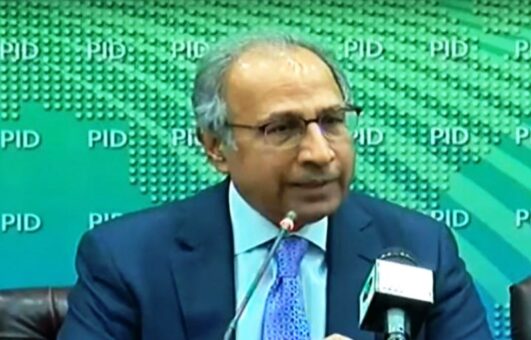KARACHI: The scale of the COVID-19 shock is underscored by the fact that for the first time in 68 years, as per the provisional estimates, Pakistan’s real GDP growth is set to contract in FY20.
“At 0.4 percent, this contraction is not as severe as that expected in most parts of the world due to COVID-19,” State Bank of Pakistan (SBP) said in its third quarterly report on the country’s economy issued on Thursday.
According to the report, successful stabilization measures that had fostered macroeconomic improvement in Jul-Feb FY20 provided a valuable cushion against the downturn faced from late March 2020 onward in the wake of the COVID-19 outbreak.
In particular, major progress had been made during Jul-Feb FY20 period in curbing the fiscal and current account deficits on the back of strong revenue growth, policy shift to a market-determined exchange rate, and build up in foreign exchange reserves buffers. Following this period of necessary stabilization, there were also encouraging signs of recovery in the real economy, including exports.
This made the economy relatively better equipped to respond to any external shocks than it would have otherwise been. This pre COVID-19 strengthening of Pakistan’s fundamentals and the prudent policy response to the outbreak later on should leave Pakistan well-placed to resume its earlier trajectory of recovery once the pandemic subsides.
As in other parts of the world, the real, fiscal, and external sectors came under visible strain thereafter as COVID-19 struck the global economy, while the inflation outlook improved as a result of weaker domestic demand and lower oil prices.
The report emphasizes that the estimated contraction in GDP owes mainly to a decline in industrial and services sector activities.
The large-scale manufacturing (LSM) posted an improvement during Jan-Feb 2020, driven primarily by exporting sectors with some contribution from food and fertilizer segments.
However, this nascent recovery was derailed by COVID-19 related disruptions, with LSM growth falling 22 percent on a month-on-month basis in March.
The agriculture sector emerged largely unscathed by COVID-19 as important crops registered a turnaround compared to last year. That said, unfavorable climate conditions and pest and locust attacks prevented some annual targets from being met.
The services sector felt the impact of COVID-19 acutely, as evident from high frequency data and negative sectoral growth is expected in FY20.
The report documents a similar pattern in the fiscal sector, where a primary budget recorded a surplus during Jul-Mar FY20 on cumulative basis, the first ever since 2016.
However, it turned into a deficit during the third quarter due to COVID-19. On the one hand, the lockdown created a drag for revenue, with growth in all categories of FBR revenues turning negative in March 2020.
On the other hand, the induced slump in economic activity and rise in unemployment created a need for greater expenditures. The government announced aRs 1.24 trillion stimulus package towards the close of Q3-FY20, consisting of a combination of targeted handouts and sector-specific outlays for agriculture, construction, and exports. While this package is expected to give much-needed relief to individuals and businesses, it would simultaneously contribute to a larger fiscal deficit in the near term.
Regarding the external sector, the report highlights that a sharp fall in imports, healthy growth in workers’ remittances, and contraction in the services trade deficit all played a part in narrowing the current account deficit (CAD) for Jul-Mar FY20 compared to last year.
However, the pandemic prompted foreign investors to reduce their domestic debt and equity holdings in emerging markets, including Pakistan, and growth in remittances has moderated.
These factors together with government debt repayments affected foreign exchange reserves in March 2020. However, Pakistan has generally been less affected than many other emerging markets and foreign exchange reserves of the country have since recovered, on the back of multilateral and commercial inflows.
The SBP report notes that the inflation outlook improved following the global and domestic spread of COVID-19.
A marked slowdown in domestic demand, stabilizing food inflation, and historic low oil prices led to a moderation in medium-term inflation prospects.
The Monetary Policy Committee responded swiftly, slashing the policy rate by a cumulative 625 basis points in five meetings between mid-March to end-June 2020.
To manage the cash flows of businesses and households, SBP allowed the deferment of principal amount and restructuring of loans. In addition, SBP launched three new refinancing schemes to support employment, new investments and BMR, and improve health facilities in the country. Together, these measures are estimated to provide a benefit of up to Rs.1.3 trillion (3.1 percent of GDP) to businesses and households.
Together with the government’s stimulus package, these measures are helping to cushion the impact of the COVID-19 outbreak. Beyond their immediate impact, these measures are expected to support the post-COVID-19 economic recovery as well.




